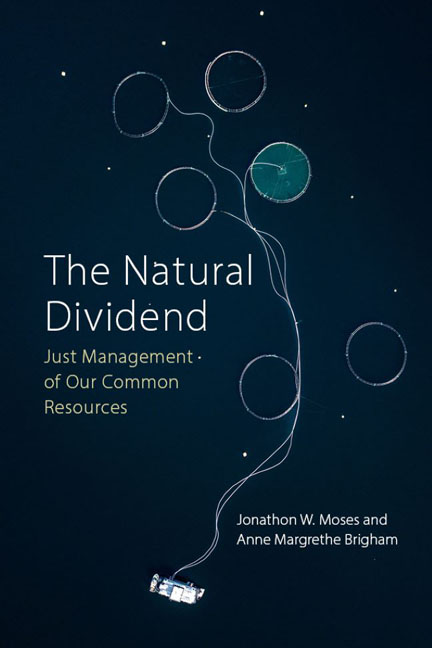Book contents
- Frontmatter
- Dedication
- Contents
- Acknowledgements
- Abbreviations
- 1 Introduction
- 2 Who owns the sun?
- 3 The Natural Dividend
- 4 The earth: the market for land
- 5 The sea: the market for salmon
- 6 The sky above: the market for renewable energy
- 7 The earth beneath: the market for fossil and mineral resources
- 8 A common market? The market for global resources
- 9 Conclusion
- References
- Index
9 - Conclusion
Published online by Cambridge University Press: 20 January 2024
- Frontmatter
- Dedication
- Contents
- Acknowledgements
- Abbreviations
- 1 Introduction
- 2 Who owns the sun?
- 3 The Natural Dividend
- 4 The earth: the market for land
- 5 The sea: the market for salmon
- 6 The sky above: the market for renewable energy
- 7 The earth beneath: the market for fossil and mineral resources
- 8 A common market? The market for global resources
- 9 Conclusion
- References
- Index
Summary
We began this book with a call to action – a call that is propelled by the urgency of our current climate (and nature) crisis. The responses to this call have been manifold and can vary across different timelines. Some analysts have focused on the long run and the need for more radical, systemic changes, such as a complete ban on exploiting non-renewable sources of energy; the rise of degrowth, or “half-earth” alternatives; even the end of capitalism itself (see, e.g., Kallis et al. 2018; Wilson 2018; Sweeney 2020). These sorts of big-ticket questions are exciting to contemplate, but difficult to bring about.
We have set our sights a notch lower and focused on a more immediate (short-term) timeline. Although the contours of these brave new worlds remain undefined and debated, we can and should begin the journey in their direction. We can do this by taking several smaller steps along the path to real change. The best way to do this, we think, is to reconsider our current approaches to managing shared natural resources. This is because it is possible to secure consensus about the desirability of these steps, even if we disagree about the final end state.
This need for a new management approach is propelled by two realizations. First, it is increasingly evident that we need to secure more sustainable sources of food and energy, and doing so will force us to explore and exploit several new resource frontiers. In all likelihood, the future will find us mining the deep-sea ocean bottom, harvesting solar power from outer space and tapping the inner earth. This future may be frightening for many, but it can also offer promise; after all, most of our natural resources remain unexplored and untapped: we have only scratched the surface, literally, of our natural bounty. We find promise in the possibility of opening these new resource frontiers. Doing so offers us an opportunity to rethink our approach to natural resource management, because it introduces a new round of enclosures, in which common wealth will be enclosed, allocated and commodified.
This brings us to the second realization: the most dominant approaches to NRM today have focused mainly on the need to secure economic efficiency.
- Type
- Chapter
- Information
- The Natural DividendJust Management of our Common Resources, pp. 221 - 244Publisher: Agenda PublishingPrint publication year: 2023



